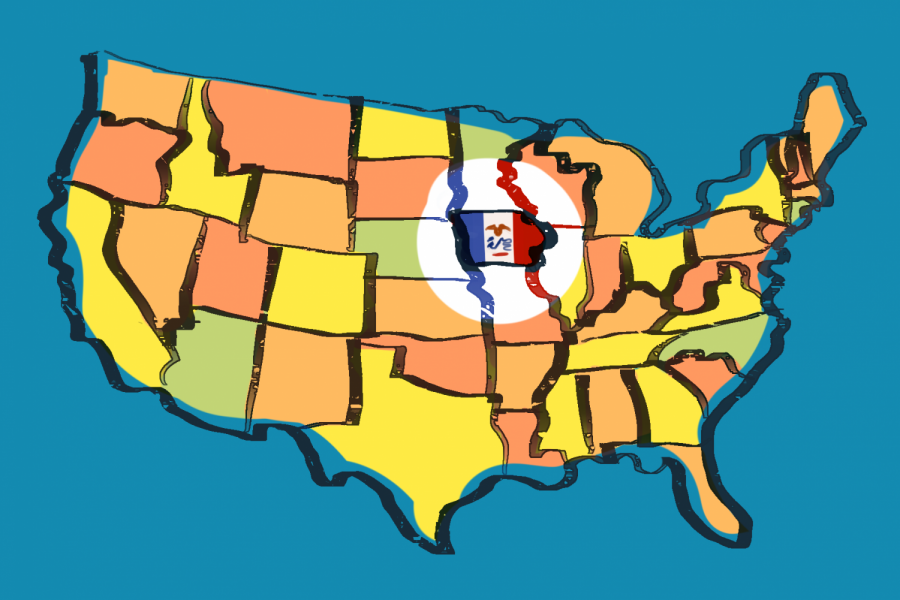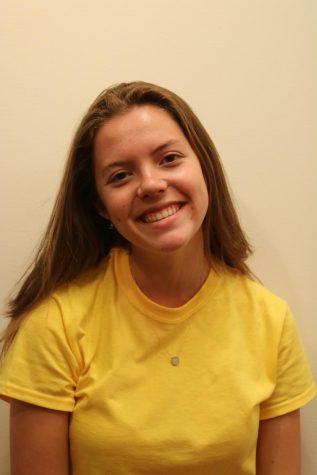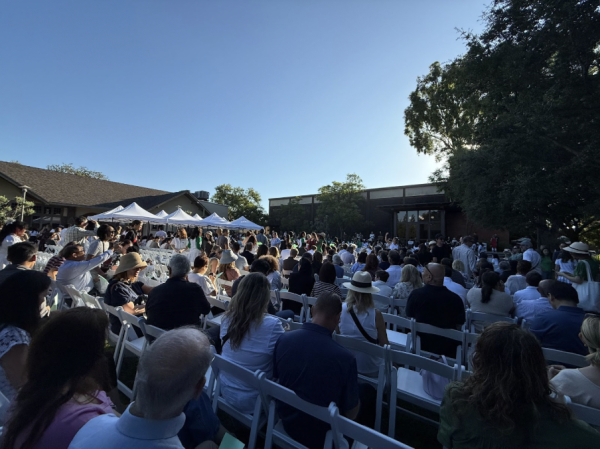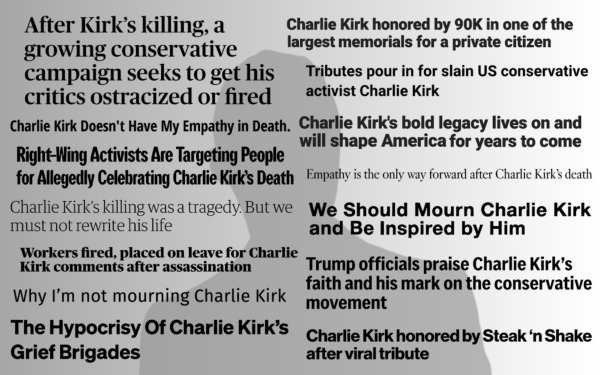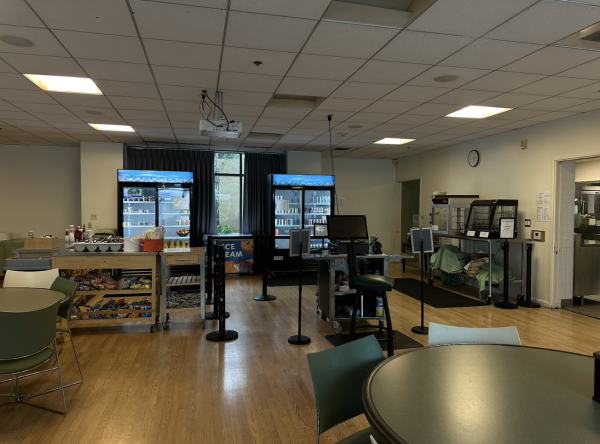Mock Caucus Raises Questions About Students’ Civic Engagement
The 2020 Iowa Caucus left millions of Democrats feeling anxious and confused. With eight major Democratic candidates still remaining in the race, the trajectory of the 2020 election, as well as the legitimacy and integrity of the voting process in this country, has the public wondering if the U.S. will see another four years of a Trump presidency.
In response to the Iowa Caucus, and perhaps as a way to raise awareness about the voting process, Student Life organized a mock caucus for Town Meeting on February 11. The open forum space was intended to invite dialogue about the Iowa Caucus and help students think critically about our role as young participants in a democracy.
Solaar K. ‘20, Student Life Chair, explained the purpose of the Westridge caucus. “We wanted to talk about the upcoming primary election on March 3 and rally 18-year-olds to vote,” she commented. Bella M. ‘21, a member of Student Life, added, “It was this idea of making it a lot easier for people to understand what is happening and then also to encourage people to start actually listening.”
However, it seems many students walked away feeling alienated and disempowered, much like their counterparts in Iowa felt. One reason wasn’t just that Westridge students had much less choice than Iowans; students also had a less informed choice.
The format of the Westridge Caucus was loosely modeled on the Iowa Caucus on February 3. In Iowa, people in 1,683 precinct caucuses gathered in libraries, schools, churches, and private homes. They physically moved into different groups based on the candidate they supported for president.
In the Hoffman Gym at Westridge, students were similarly asked to stand up and separate into different corners of the room, where members of Student Life held posters advertising five of the top Democratic candidates: Joe Biden, Bernie Sanders, Andrew Yang, Elizabeth Warren, and Pete Buttigieg. A sixth section was dedicated to those who instead identified with “other.” According to Student Life, this category was for anyone whose “beliefs do not lay with any of the candidates we discuss,” including undecided voters, Republicans, and those supporting a different Democratic candidate.
“I was shocked that Student Life did not provide a location for those voting for Trump to stand in the gym, but rather grouped them with ‘other,’” said Quintynn V. ‘21.
Before the caucus began, Claire D. ’21, a member of Student Life, specifically discussed how this activity was not meant to isolate conservative voices. “As always, we appreciate and encourage all perspectives to speak. If you do not support any of the candidates, we want you to come up and tell us why,” she announced. Unfortunately, Student Life ran out of time, and the discussion portion of the activity was cut at the last minute.
Student Life explained that they were holding a Democratic caucus because President Trump has already been chosen as the Republican nominee, which is technically incorrect. However, it is certainly true that a Democratic caucus or primary in 2020 is much more competitive than a Republican one – Donald Trump received 97.1% of the votes during Iowa’s Republican caucus and is all but ensured to become the Republican candidate following the Republican primary.
One issue was the fact that students could not opt out of attending this Town Meeting, or rather, that option was not fully presented to them as such.
In addition to not being able to choose whether or not to attend Westridge’s mock Democratic caucus, with only five candidates represented in Hoffman Gym, students had a lot less choice once they got there. “I did not feel like the representation was accurate,” Maris B. ‘23 commented. “I noted that Amy Klobuchar was not in the list of candidates, and I felt like certain candidates were highlighted more for their cons than their pros.” In Iowa, Senator Klobuchar won 12.3% of the vote while Yang received only 1%. He has since dropped out of the race.
But it wasn’t just a lack of choice, it was a lack of informed choice that seemed to plague Westridge’s mock caucus.
Student Life introduced the activity by first providing descriptions of each of the five candidates. “I thought the idea was interesting,” expressed Anelise P. ‘20, “but … the introductions to each candidate were not nearly as informative as they should’ve been, and it created a less serious tone for the activity that followed.”
Little was offered about Senator Sanders’ policies besides his identity as a “socialist” (Senator Sanders actually calls himself a “democratic socialist”), his age, and the fact that most of his father’s family died during the Holocaust. No real distinction between Sanders and Warren’s support of Medicare for All was offered. “I think the research on the candidates could’ve been more succinct and relevant to their platforms,” Solaar reflected.
Despite their good intentions, the open forum platform may have missed an opportunity to provide real and accurate information about the candidates. Frances L. ‘23 addressed this: “I didn’t feel informed enough to make the best decision I could have made and I still had many questions regarding some candidates,” she admitted. In Iowa, supporters at caucus precincts “make the case for their candidates” and try to convince other caucus-goers to join them in supporting a particular candidate.
“I wish that people were able to give their opinions about the candidates and why they would choose to vote for them,” continued Bella. “I don’t think it was planned as well as it could’ve been.”
Spyglass reached out to Bonnie Martinez, Dean of Upper School Student Support. She was unavailable for comment.
One high schooler, who preferred to remain anonymous, disagreed with the format of the student caucus. “I did not see the point of asking us to choose a candidate,” she shared. “By doing so, I felt like the school was only separating our community further.” She revealed, “I have actually found the culture at Westridge unbearable.”
It should be no surprise if the heated political climate at Westridge reflects that of the dialogue happening outside our gate. Yet Westridge’s left-leaning culture has made some conservative voices reluctant to participate in the public discourse.
It’s not just conservative students who are feeling inadequately supported by the community. No one Spyglass interviewed felt the mock caucus significantly informed them on the candidates. This is perhaps part of a larger issue regarding an informed citizenry. Without proper media literacy and access to information, more people are falling victim to fake news—and young people, without proper guidance, are particularly vulnerable. A 2016 study by the Stanford History Education Group (SHEG) found that young people have difficulty distinguishing between objective and sponsored online content.
Running a mock caucus at Westridge is a way for students to learn more about the political process and perhaps develop a sense of civic awareness and duty. Many schools, including Westridge, hold or have held mock elections or debates. In fact, Alex Padilla, Secretary of State for California, organizes a statewide mock election for students.
Holding mock elections and caucuses is one thing schools can do to support student civic engagement, but the engagement need not begin and end there. A 2012 study by the Department of Education noted that less than a quarter of high school seniors scored proficient on the 2010 National Assessment of Educational Progress (NAEP) civics test.
The department concluded that many teachers view civics learning as an add-on and distraction from core content. Although no official class on government or civics is currently offered at Westridge, many students have already waded into the political landscape by attending marches and seeking greater political discourse, in which case the recent mock caucus and others like it could inspire, or even indicate, the need for more opportunities for students to develop civic engagement on campus.
“Generally speaking, I think anything that you can do to heighten students’ engagement in matters of civic responsibility is a good thing,” Director of Upper School Gary Baldwin asserted. “Making something real, immediate, and physical . . . is sort of forcing kids to confront issues and think about them,” he continued. “It’s too easy now to treat politics as either something that happens far away from you, something that you don’t really need to be concerned about, or as something that’s a forgone conclusion…really, we are meant to grapple with all these issues.”




























![Dr. Zanita Kelly, Director of Lower and Middle School, pictured above, and the rest of Westridge Administration were instrumental to providing Westridge faculty and staff the support they needed after the Eaton fire. "[Teachers] are part of the community," said Dr. Kelly. "Just like our families and students."](https://westridgespyglass.org/wp-content/uploads/2025/03/dr.-kellyyy-1-e1748143600809.png)






















